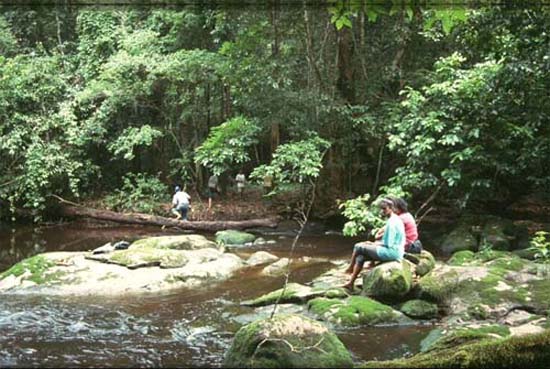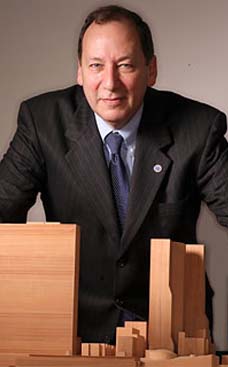
During that time, he worked primarily for the World Wildlife Foundation in Paramaribo, Suriname’s capital city, updating the organizations Web site, helping to edit grant requests and other documents in English and serving as a contact person for other Peace Corps volunteers working in the interior. Like many Peace Corps volunteers, Evans suffered from culture shock during the first half of his two-year service, but was comforted by the familiar sties, such as karaoke bars and bowling alleys. The city had no movie theater, but bootleg DVDs of the latest American movies were easy to come by. By the second year, Evans, now 30, was more comfortable and had developed close friendships with both locals and other Peace Corps volunteers.
Jake Evans serves as a Peace Corps Volunteer in Suriname
Working for WWF abroad
By Christian Schiavone/Staff Writer
Mon Dec 08, 2008, 01:08 AM EST
Acton, Mass. -
When Jake Evans graduated from Fitchburg State College in 2003, like many recent college alums, he still wasn’t exactly sure what he wanted to do with his life.
He’d been interested in the Peace Corps since seeing the old television commercials touting Peace Corps work as “The toughest job you’ll ever love.” But he had written off the idea as being too unrealistic when he graduated.
A few years later — after a string of temp jobs, as well as stints working at Harvard University and a bank — Evans decided to join up.
Evans, who grew up in Acton and recently moved to Somerville, started his service in Suriname, a former Dutch colony on the northern coast of South America, in March 2006 and returned last summer.
During that time, he worked primarily for the World Wildlife Foundation in Paramaribo, Suriname’s capital city, updating the organizations Web site, helping to edit grant requests and other documents in English and serving as a contact person for other Peace Corps volunteers working in the interior.
Like many Peace Corps volunteers, Evans suffered from culture shock during the first half of his two-year service, but was comforted by the familiar sties, such as karaoke bars and bowling alleys. The city had no movie theater, but bootleg DVDs of the latest American movies were easy to come by.
By the second year, Evans, now 30, was more comfortable and had developed close friendships with both locals and other Peace Corps volunteers.
Evans spoke to The Beacon recently about his time in the Peace Corps and how it has helped give him a new sense of what he wants to do in life.
Q:How did you wind up in Suriname?
A:They choose for you. You get to declare kind of a preference. I told them I didn’t want to go to South America, so that’s exactly where they sent me. I had no experience with the Spanish language, which is pretty prevalent. I have family roots in Eastern Europe, which is where I really wanted to go. A few weeks after my initial interview they said, “Well, we have a nomination for you, we’re sending you to non-Spanish speaking South or Central America. That meant one of three countries — Belize, Guiana or Suriname.
Q:Were you disappointed when you wound up going to South America?
A: At first, a little bit. I had all these friends in the Peace Corps who were going to places that sounded so much more interesting. I was feeling a bit of “the grass is greener.” But then when I got there, I met some very good people. The group I was with was very strong, we had a lot of people who were very excited to be there, who were very interested in what they were doing, interesting personalities, fun people to hang out with. I would have definitely had a different experience if I’d gone somewhere else. It might have been a better experience, but everything worked out pretty well for me.
Q: What kind of work were you doing there?
A: I worked in the small business program mostly focusing on kind of micro-enterprise, getting people who might not think that they could start a business to make money for themselves, get them the tools they need in order to do that. Oddly enough, they assigned me to work with the WWF (World Wildlife Fund) — that’s pandas, not wrestlers — so I spent a lot of time working in an office doing environmental work. A lot of odd job kind of things. It felt a lot like being an intern again. Someone would show up and say, “Hey Jake, I’ve got this project I need your help on.”
But one of the major things I did consistently was work on the Web site. I also worked a lot with the wildlife officer. She did a lot of educational programs, worked with a lot of people in the interior, so I helped her set up for her trips, create educational games and materials. One of the more intimidating things they had me do was the office was looking for grants for their budget for their next few years, so I got to edit a 100-page, 3 million Euro grant document.
Q: I’ve heard when you join the Peace Corps it’s never quite what you expect. Is that true?
A: That’s absolutely true. I wasn’t expecting the country to be what it was. Suriname has one city, Paramaribo, and the tallest building is the bank, which is a six-story building. Everything else next to it is two or three stories. There’s about 200,000 people living in it and the entire country only has about 400,000 people. I knew I didn’t want to live in the jungle, that was my main goal. I was pleasantly surprised that I had a nice apartment with electricity and running water, I had a kitchen, my landlady provide a TV for me. It was like having a small apartment in a small city in the States. I had to ride my bike or take a bus to work everyday.
I worked practically every day, either by going to the WWF office or with other secondary project. It was very hard for me to evaluate my experience while I was there. While you’re in the middle of something, you don’t really have that much perspective. There were times I felt miserable; there were times it was great. The end of my experience was great, the beginning was kind of bad, just culture shock hit me really bad. But coming out of it, especially being out of it after a few months, it was a really positive experience for me. I feel a whole lot better about myself and about the things I think I can accomplish. I think it’s something a lot of people should consider doing.
Q: Do you have a better idea now of what you want to do?
A: Actually, yeah. I’m still trying to figure out how to go about doing it. As soon as I got back, one of the first things I did when I was waiting in the airport was I found Time magazine, and the cover story was an article by Bill Gates talking about how the corporations in this day and age need to worry more about their social responsibility to the world and less about their bottom line. And that really resonated for me while I was reading it and then I promptly forgot about it for a month or two while I was getting used to living at home again.
I started doing a job search while I was getting information on graduate programs and one popped up saying, “Get your MBA in corporate social responsibility.” So I started looking into that and it really seemed like something I wanted to pursue, not necessarily as that specific kind of job, but definitely to work for a company that does feel that their social responsibility is a priority. That’s the avenue I want to go in, that’s the kind of thing I want to push myself to do and hopefully push the world into, too.
Christian Schiavone can be reached at 978-371-5743 or at cschiavo@cnc.com.













